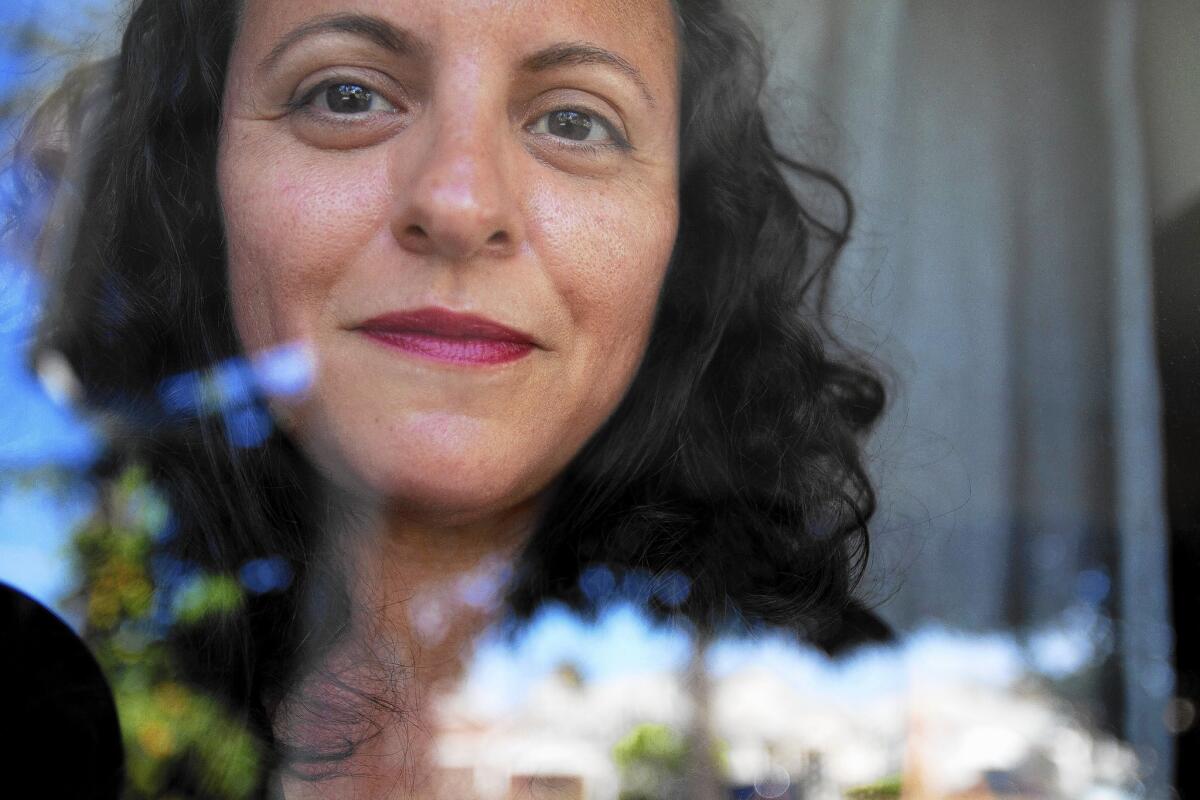‘Excavation’ digs up memories of an illicit child-teacher relationship

- Share via
When she was just 13, Wendy Ortiz began to learn important lessons about love, honesty and human depravity. She was a precocious eighth-grader, and she was about to fall under the spell of her 28-year-old English teacher.
“Jeff Ivers,” as the teacher is known in Ortiz’s new memoir (it’s not his real name), was at once charming and manipulative. Almost immediately, he seized on his student’s desire to be a writer — she’d already produced a handwritten novel — to get closer to her.
“Mr. Ivers wants you to call him at home,” a classmate tells her. “Here’s his phone number. So you guys can talk about your book.”
“I didn’t question why my friend had my teacher’s phone number,” Ortiz writes. “All I could think about was when.”
“Excavation: A Memoir” (Future Tense, $15 paperback) is Ortiz’s account of the events that unfolded after she called Jeff back. Ortiz, now 41, is a San Fernando Valley-raised poet, essayist and literary activist. “Excavation” is her first book. It’s a work of unfettered emotions and explicit descriptions that explores her troubled youth and teenage struggles to understand her budding sexuality.
Not long after she called Jeff back, he began to try to seduce her. It was a crime, but as a 13-year-old she didn’t see herself as a victim. Young Wendy thought she was in love. In “Excavation,” Ortiz the writer makes it clear that there are no easy explanations for what transpired in Jeff’s apartment and the other places they met.
“I’m writing about something that people prefer to see as black and white,” Ortiz says in the West Adams home she shares with her girlfriend, Sandy Lee, and their 3-year-old daughter. “But I really want to expose the grays.”
In “Excavation,” Ortiz shares passages from her teenage journals. The book covers the four years Wendy spent seeing Jeff, a relationship that ended before she turned 18 and that she kept secret from the adults who might have stopped it.
“I didn’t want to be average,” Ortiz writes in a chapter titled “Why I Didn’t Tell.” “I didn’t want it to end. I was comfortable keeping secrets. I was afraid of being blamed. I felt responsible for his acts. I was numb…”
Honesty is a hallmark of Ortiz’s work. As a poet and essayist, she has mined her own life again and again. “Ortiz writes with a raw, wrenching, vulnerable truth that is refreshing, grounding, and full of life-sustaining filaments,” Jessica Dewberry wrote in a critical essay in the Los Angeles Review of Books in April. “When I read her work I feel exposed, aired-out, and satisfied.”
Sitting at a long table in her living room, with her daughter’s toys and chalkboard nearby, Ortiz summed up what drives her to write. “I want to be really committed to going to some of the darkest places and taking that and making it art,” she said. “I want to work with things that are uncomfortable and scary.”
In a 2012 essay for the New York Times’ “Modern Love” column, Ortiz described an episode that unfolded some years earlier — falling in love with another woman as she prepared to marry her husband. The affair that inevitably followed ended her marriage but forced Ortiz to sort out who she really was.
Now Ortiz is becoming a therapist. In addition to a growing resume as a writer, she has a master’s degree in clinical psychology and is working at a Los Angeles clinic, finishing the final intern hours she needs to get her license. The work she does in private sessions with her clients mirrors her own journey. “It’s been a constant process of trying to understand the arc of my life, and what it all means,” she said.
At the same time, Ortiz is curating the Rhapsodomancy reading series she started in 2004. During its first decade, it’s hosted an all-star cast of Los Angeles writers, including Chris Abani, Bernard Cooper, Dana Johnson and Nina Revoyr.
Her own writing is often witty and self-effacing, as with her column on the marijuana dispensary culture for McSweeney’s. She’s 12,000 words into a memoir based on her “Modern Love” essay and her failed 2007 marriage and confesses to being stuck. “I think it takes me at least 10 years to digest an experience before writing about it,” she said. Another memoir, “Hollywood Notebook,” tackles her move to that L.A. neighborhood and is due out in November.
As Ortiz worked to transform her experience with “Jeff” into a book, she was inspired by two memoirs that tackle themes of sexual identity, she said: “The Chronology of Water” by Lidia Yuknavitch and “Firebird” by Mark Doty.
Ortiz said she wanted to offer a full portrait of the man who entered her life when she was still a child. In “Excavation,” Jeff comes off as an exceedingly immature, needy and creepy 28-year-old. Thanks to Megan’s Law, Ortiz said, she has since discovered Jeff is a registered sex offender who’s been convicted of a lewd act with another minor.
Ortiz showed her manuscript to several literary agents who’ve contacted her as her career has blossomed. But none, she said, took on the task of trying to sell her memoir. “I kept hearing the same comments from them,” she said. Her book was “beautiful,” they told her, but also “dark” and “difficult.” Eventually, she sold “Excavation” to editor Kevin Sampsell at a small Portland publisher, Future Tense Books.
“It’s real and honest and not heavy-handed or moralistic,” Sampsell said of Ortiz’s book. “Other less-finessed writers would probably have gone in those directions. She seemed to have a lot of control over her subject matter.”
Ortiz’s mother is among those who may soon learn for the first time what Wendy went through as a middle-schooler. Even as “Excavation” was published this month, Ortiz had yet to tell her mother the full truth about her English teacher. Her mother is frail and doesn’t read much, Ortiz said. And she lives in the same Valley house where Ortiz grew up.
“I’ve been afraid for people to see this,” Ortiz said of the story “Excavation” tells. “For some this might be a new concept: that a victim might have some agency in the situation she’s trying to navigate. And that she might make decisions some people on the outside might not understand.”
Follow me on Twitter: @TobarWriter
More to Read
Sign up for our Book Club newsletter
Get the latest news, events and more from the Los Angeles Times Book Club, and help us get L.A. reading and talking.
You may occasionally receive promotional content from the Los Angeles Times.










